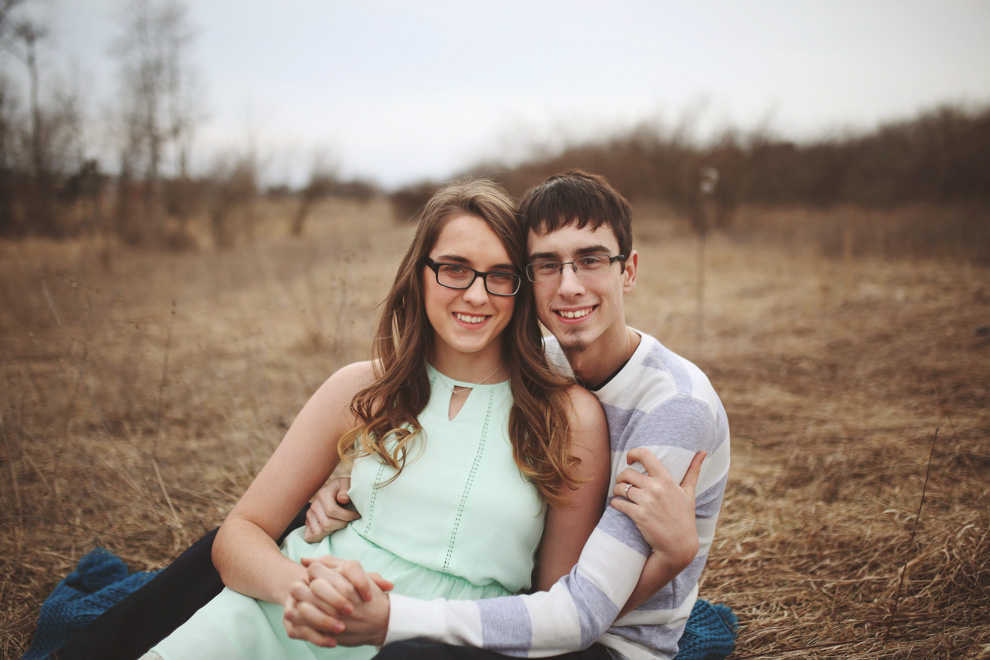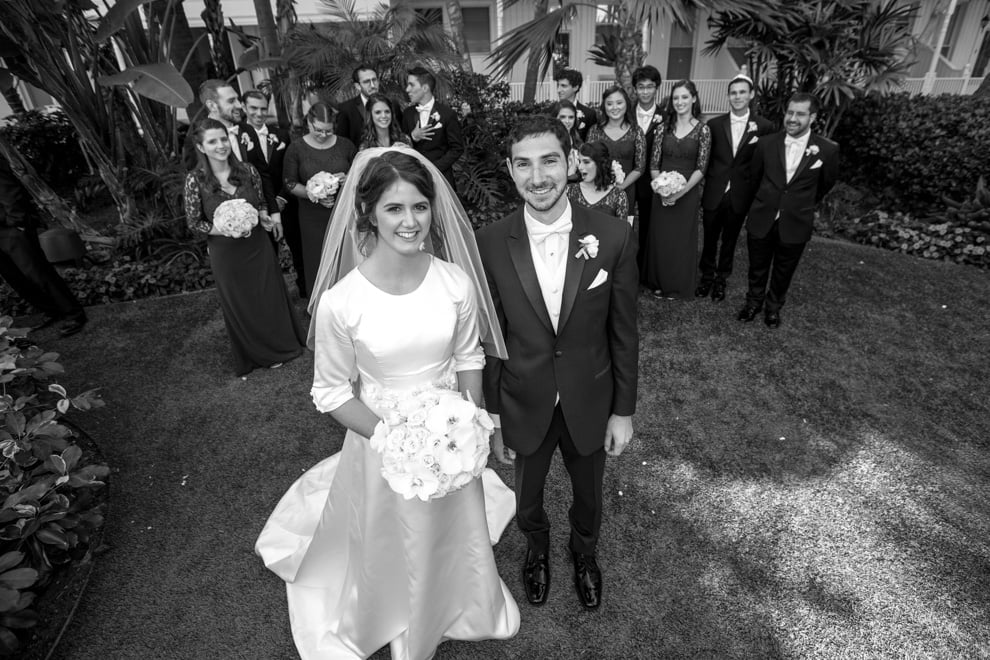Goldie Grinberg ’19 and Josh Grinberg ’15 M.S. ’17 discovered that their religious values perfectly aligned when they first met at Hillel in July 2017. One year into their relationship, after Josh finished his master’s and started working for Google, they were married.
Goldie, who is currently in her junior year, had to ask the University for permission to move a midterm exam in order to prepare for her wedding the next day. The pair’s Jewish wedding ceremony took place in November 2017 in San Diego and was attended by their family and Stanford friends. The couple now lives in an off-campus accommodation.
Hunter Stroh ’21 will return for her sophomore year next fall with her husband-to-be, Bailey Mears. Hunter and Bailey met in their junior year of high school in Michigan. She was the new girl from out of town and caught Bailey’s attention immediately when she walked into their English class.
They dated during their final years of high school and doubted whether they would continue their relationship once Hunter started college. But when Bailey got into a serious car accident, Hunter was by his side — and the experience ultimately cemented their relationship.
The two maintained a long-distance relationship during Hunter’s freshman fall. Last winter break, Bailey proposed to her in front of his family. The couple will marry this July and live on campus together in the 2018-19 academic year while Hunter pursues the pre-medicine track and Bailey seeks work in the welding profession.
While the University does not track the marital status of students, there are currently 32 undergraduate couples living in graduate housing, according to University spokesperson E.J. Miranda.
“We only require that the couple attest to being in a long-term romantic relationship and have shared responsibilities,” Miranda wrote in an email to The Daily.
Undergraduates in a domestic partnership seeking accommodation enter the housing draw with other graduate students for a year-long lease of a one-bedroom apartment. Only one person in the partnership must be enrolled as a student to maintain eligibility for housing.

Religious motivations
While Goldie said she was not particularly religious when she began university, her Jewish faith grew at Stanford and played a pivotal role in her decision to marry Josh.
“I did not think I would get married as an undergrad,” she said, laughing. “The thought never crossed my mind.”
She said that her religious values have shaped her attitude on relationships, values which Josh — who served as president of the Jewish Student Association as an undergraduate — shares.
“When I met Josh, one of our initial conversations was that if we were going to date, it would be to see if we were compatible for marriage … and if our morals aligned,” Goldie said. “Rather than just dating for enjoyment, it was really dating with a purpose.”
Up until the day of their wedding, Goldie and Josh refrained from physical contact to respect the Orthodox Jewish practice of “shomer negiah,” which prohibits individuals from touching members of the opposite sex outside of their immediate family. Goldie said that abiding by this practice made it all the more special when she and Josh first held hands at the wedding ceremony.
“By guarding the touch … our relationship was purely built on our discussions and the emotional connection,” she said.
Both Hunter and Bailey said that their Christian faith guided them in their decision to marry young.
“We think it’s God’s plan that we met each other,” Hunter said. “Whenever I think about it, you know — ‘What if it is too soon, or what if we are too young?’ — I just remember back to that moment when I knew God was telling me he’s the one.”
Bailey shared a similar religious experience, recalling his sudden urge to buy an engagement ring.
“I went and bought a ring and then prayed over it for a week, week and a half, then got the confirmation that I felt I needed,” he said.
Facing stereotypes
Goldie said she faced “polar opposite reactions” from her Jewish and non-Jewish friends on campus when she revealed her engagement to Josh. While her friends in the Jewish community were not taken by surprise, when it came to telling the news to the friends in her dorm and classes, several jaws dropped.
“For religious Jews, this isn’t foreign, although it’s still a little on the younger side,” Goldie said. “Whereas with my other undergrad friends, they were shocked. It was really just utter disbelief.”
Explaining why she thinks most Stanford students have been surprised to discover that she is married, she pointed to a culture of casual relationships on campus.
“There really is a prevailing hook-up culture at Stanford, and so people see relationships as purely fun, pleasurable things,” Goldie said. “To take it seriously and commit to someone can seem foreign to them.”
Nevertheless, she said she hopes to challenge the stereotype that young religious couples conform to traditional gender roles.
“Just because it seems traditional for Josh and me, I really do believe the exact roles of each spouse is couple-specific,” Goldie said. “As long as both [husband and wife] are happy with the situation and would be willing to do what’s best for the family, then there shouldn’t be any pressure on them.”
Similarly, Hunter and Bailey also reported stereotyping and discouragement in response to their choice to get married in college.
“Everyone says you shouldn’t care what others think, but you kind of do,” she said, adding that she finds it frustrating having to defend her decision. “When you have people constantly coming at you or doubting you, you start to doubt yourself.”
According to Hunter, her peers at Stanford were shocked upon seeing her engagement ring because they have different life priorities.
“For me, my goal — and all I really want to do in life — is to be a wife and a mother,” she said. “I want to be a stay-at-home mom, but the rest of the world is telling me that I shouldn’t.”
Hunter added that she is critical of the feminist movement for occasionally undermining women who choose to fulfill traditional roles.
Hunter encouraged people to listen to their story before they judge her and Bailey as “some crazy religious freaks,” adding that the couple has been deliberated carefully about the question of marriage and has been saving up money since high school.
“It’s not like this is a spur-of-the-moment decision, but people treat us like it is before they get to know about our plan,” Hunter said.
Balancing commitments
Goldie said balancing her academics, relationship and home responsibilities have forced her to be more efficient with her time, which she tries to achieve by compartmentalizing.
“When I am on campus, I know I am in a work and study mode … and then I have more time at home, where it’s nice to be able to focus time and attention on [Josh],” Goldie said, adding that she also carves out time in her schedule to do “chores like cooking and doing the dishes and cleaning the house, which were never an issue in the dorms.”
Nevertheless, Goldie said she believes being married has only “enhanced” her academic endeavors and goal of getting into medical school.
“Having a best friend who knows me as well as I do … and a support system even on those hard days, I think has only made me stronger and made me excel in my studies,” she said.
On the other hand, Hunter says she has struggled to play the juggling act, reading off a list of her many competing commitments.
“We have a wedding to plan, we have a relationship to focus on itself, we have family problems back home, future plans, trying to maintain a social life as well,” she said. “I’m not going to pretend that I have it down.”
Bailey said he looks forward to starting the next chapter of his life with Hunter and to begin living on Stanford’s campus, which he believes will open up more opportunities to him.
“I wasn’t headed down the right path even before I met her, so I would probably just be out partying,” Bailey said, imagining his life without Hunter. “I told my [dad] I was moving to California with her. He said, ‘Do it as soon as you can because if you don’t, you’ll never go.’”
Bailey mentioned that he was particularly excited to use Stanford’s gyms. Spouses of students are eligible to receive courtesy cards, which gives them access to a variety of campus facilities, including those within the Department of Athletics, Physical Education and Recreation.
Campus resources and support
Goldie admitted that she has found it difficult to connect with her peers’ relationship experiences since there are few married undergraduates on campus.
“I found I couldn’t really relate to anyone because there are things exclusive to marriage,” she said.
Nevertheless, Goldie said she has been able to share her experiences with married women in her Jewish network, including Rachel Greenberg, the program director at Stanford’s Rohr Chabad House. She cited her mom as her greatest source of support.
According to Miranda, undergraduate couples housed in graduate residences are able to access support services through the Graduate Life Office.
“They can also access their local residence staff, the Community Associates who serve as a neighborly helpful resource to residents,” Miranda wrote.
For undergraduate couples with children, the Stanford WorkLife Office offers childcare resources and referral services to help couples plan for and find childcare. The office also provides one-on-one counseling to help couples manage their competing work, school, family and personal responsibilities.
Hunter concluded by expressing her desire that the community respect undergraduates who choose to marry while they are still in college.
“We’re like any other minority on campus — we need support,” she said. “We don’t need people believing all of these stereotypes about us.”
Contact Yasmin Samrai at ysamrai ‘at’ stanford.edu.
